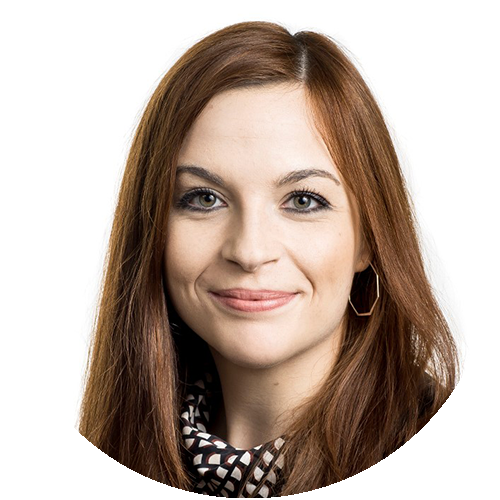Today Elisabeth Oppenauer took some time for our curious questions about her everyday life as an MDI Consultant in a detailed interview. She addresses the challenges that digitization poses for the L&D sector and points out exciting developments that await you in this area in the future!

About the author
Elisabeth Oppenauer, also lovingly called Elli by the team, consultant and team lead at MDI, talks today about her experiences and insights in the leadership & development area. Her journey at MDI began as a junior consultant and her passion quickly led her to growing into the team and HR management.

About the author
Elisabeth Oppenauer, also lovingly called Elli by the team, consultant and team lead at MDI, talks today about her experiences and insights in the leadership & development area. Her journey at MDI began as a junior consultant and her passion quickly led her to growing into the team and HR management.
What do you particularly like about your role as L&D Consultant?
I am very fond of working with truly renowned experts and luminaries in this field. Every day I’m allowed to learn something new at MDI. Furthermore, I like the fact that you get the chance to have a look into many different organizations and exchange information with clients. Challenges result from the different ways of dealing with customers. With one customer you talk more on the relationship level, with another customer you need to consider completely different aspects when conversing with them. Keeping this balance constantly is a challenge that I like very much and it’s also a point where I realize that I can grow from it.
Are there also moments between all the challenges where you think “this is exasperating”?
Yes, sometimes having so many meetings is really exhausting. Not the customer meetings, because they are useful for exchanging important content, but the internal meetings that fill the working days of so many of us. Do you really need a meeting on certain topics? Or can it be coordinated in a few minutes? Maybe during getting lunch together or just having a shotz phone call.
How do you and your team make your workday productive?
We try to implement some lean principles. Together with my team I cancelled the Jour-Fixes for example. We are now trying to be in a continuous exchange. When I need time to concentrate, I block a timeslot in my calendar and the other way around as well. We now have a Team-Jour-Fix once a week and define our weekly To-Do’s. Furthermore we take a look at last week’s ToDo’s an reflect: What were hindering factors for the completion of our ToDo’s? What can we improve? In order to visualize our findings, we additionally work with a digital Kanban board.
What makes you laugh every day during your work? What really gives you joy?
My team and my colleagues, of course. Every day when you come to MDI, it feels like you’re just spending time with friends. And also with clients and trainers it is really a lot of fun and pleasure to work with so many people every day.
The cooperation with my team and clients is a motivating factor for me because I’m a very interactive person.
Since I commute on a daily basis, I enjoy taking the time in the morning to listen to podcasts, audio books or just music. In more intense times, I also listen to motivational speeches. These are the factors that help me staying motivated. In addition, it gives me strength to know that at MDI you have an impact or generally as a consultant in the executive area. It makes me feel like I have made an active contribution to ensuring that managers know their strenghts and those of their employees as well, are more reflective and deal well with employees. That’s a nice feeling and motivates me a lot.
Your working day sounds very interesting. What stories do you like to tell your friends?
My favorite stories are actually stories with clients. I love pitching, in the sense of: We receive a request, an offer is made and then there comes the day when one is invited and is allowed to present the offer with colleagues. An offer, which took a long time and deep thought to develop that you one really is convinced of. Sharing this effort with the customer and exchanging technical and content information is a thrill itself. And I love sharing this with others.
Let’s assume you won your pitch. From your point of view, what is the most important thing for successful training measures?
The learning transfer. How do the participants transfer what they have learned into everyday life? In my opinion it’s a lot about the on-the-job measures that should be taken, reflecting on my own Key-Take-Aways and dealing with how I can apply what I have learned in my everyday life as well as promoting the exchange with colleagues. After a certain transfer phase it also makes sense to have a retrospective and ask oneself in the plenum: What went well? What did not work perfectly during the implementation? What could I do better and what input do I need to make progress in my development as a manager?
Do you already notice changes in learning transfer and consulting in general due to the digitization?
Yes, definitely. The customer inquiries that reach us nowadays move away from “We need an executive program for next year”. Nowadays, inquiries that reach us are more like “In three months we will need this and this program with these measures, please support us”.
Why is this happening? We live in a complex and fast-moving world. Acting agile is becoming more and more important. Leaders need proper content and tools much faster available, which is why the e-learning focus and 1-click applications are growing.
Is this also the reason why this fast pace and digitalization sometimes causes challenges in projects?
Yes, challenges in projects arise due to a lack of time resources. In addition, internationalization adds another cost factor, since you can’t fly in all the people involved. In other words, you really must consider: How can these challenges be solved virtually? For instance, to cope with this we commonly use interactive webinars.
Other challenges arise when you realize during a program that content, that was up to date a few months ago, suddenly needs to be revised due to changed requirements. In such situations both the client and the consultant need to have the confidence to say: Let’s delete or rename the module completely. Often the real challenge is the mindset and not the emerged obstacle. In conclusion, sometimes it just takes a little courage.

bLet’s stick to the international topic: To what extent do projects differ from national and regional projects in terms of degree of complexity?
I find that the country-specific aspect, which was much more prominent a few years ago, is receding further and further due to globalization.
However, challenges still evolve in international projects since usually more stakeholders are involved. Countries and contact persons have their own expectations and demands and as a consultant it is important to collect them. I believe that you should never expect yourself to be able to make everyone happy, but instead try to find the best possible solution for everyone.
What is your favorite part in international rollouts?
Meeting people all over the world. Moreover, it is exciting to get to know trainers and clients, having discussions with them and recruiting new trainers. You meet so many different characters and people and sometimes even good relationships develop. Once you hear sentences like “Next time you’re in China, just call me!” you know your work really pays off.
After gaining international experience, how do you perceive interculturality in international programs? Challenging?
To be honest, and I believe that this also has something to do with globalization and increasing interconnectedness, I no longer see it as very challenging.
Surely, country specific cultures are still noticeable in business context. In some countries communication is a little more distant, in some this is no longer the case at all. But so far, I have not had the impression that it would have been a greater challenge interculturally. People all over the world start speaking a common language. And I believe that platforms like Facebook, Instagram or LinkedIn contribute to the fact that we all speak this common language because of our interconnectedness. Hence it’s becoming less challenging now than it was a few years ago.
What impact do you expect the digitalization to have on the L&D area?
In my opinion, there will be a tremendous impact on the e-learning area. At the same time, however, I believe that on-the-job measures, classroom trainings and “bringing everyone back together” will become even more important. It’s going to take both. I imagine an app where you can indicate what you need at the moment and then an algorithm proposes appropriate measures. However, I firmly believe that this technological future will not replace trainings themselves, on the contrary. It will be even more important to sit down at the same table with others and have real conversations in our highly digitalized world.
Do you personally notice that your work is in a state of change?
Personally, so far I noticed that you have to act faster, in a more agile way. Requests and inquiries are getting more short-termed. At this point we definitely need an agile mindset. There’s always a solution somewhere. But you can only find it by possessing the appropriate time resources. Having a lean way of working can help a lot here.
There also is change in the way people interact with each othe. At the customer level I personally perceive less competition and that exchange is highly appreciated. For example offering a client the opportunity to exchange information and cooperation with another client in the same industry is now warmly welcomed. In my opinion, this is very exciting and nice to observe.
Thank you Elli, for your wonderful insights and your insightful, personal thoughts!

